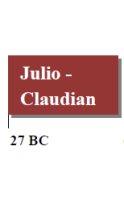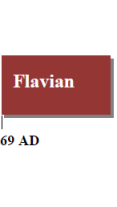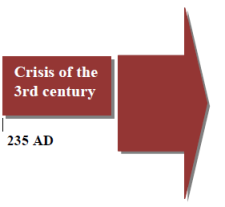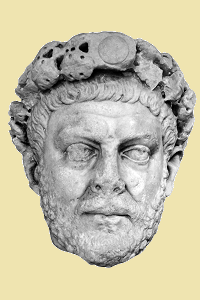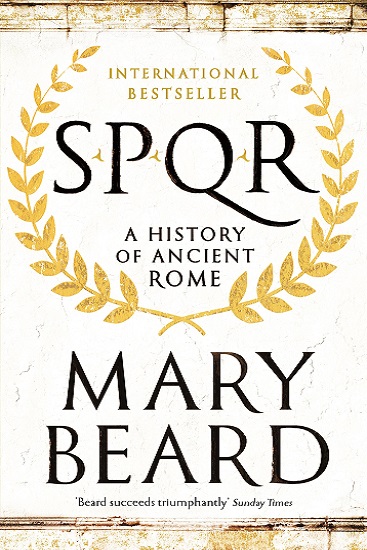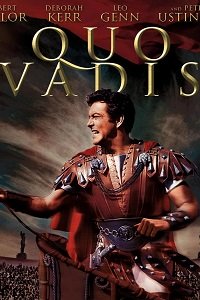The Roman Principate (27 BC - 284 AD)
Updated on: 08 May 2023Reading time: 15 minutes
The first period of the Roman Empire is called the Roman Principate. During this period, emperors tried to give the impression of a functioning republic when in fact they had full powers. Rome remained in theory a republic but emperors gradually destroyed all republican values. The Roman Principate was a prosperous and stable period, even more so than the Roman Republic.
Click on any of the boxes below pertaining to each dynasty:
The first Roman Principate dynasty: the Julio-Claudian dynasty (27 BC- 14 AD)
Following the Battle of Actium and the death of Mark Antony in Egypt, Octavius had full powers in Rome. In 27 BC, he took the name of Augustus and established what would later be called the Julio-Claudian dynasty. This dynasty had five emperors: Augustus, Tiberius, Caligula, Claudius, and Nero. It was called Julio-Claudian because Augustus came from the gens Julia, which was one of the oldest patrician families in Rome (he was Julius Caesar's grand-nephew), and because Tiberius came from the gens Claudia, which was also an old patrician family and one of the most prominent.
Augustus (reign: 27 BC - 14 AD)
Very quickly, Augustus acquired all powers and the title of princeps. He held various positions, including consul, censor, tribune, aedile (who was in charge of the maintenance of public buildings, public order, and the regulation of public festivals), and even princeps senatus (who was the first member by precedence of the Roman Senate).
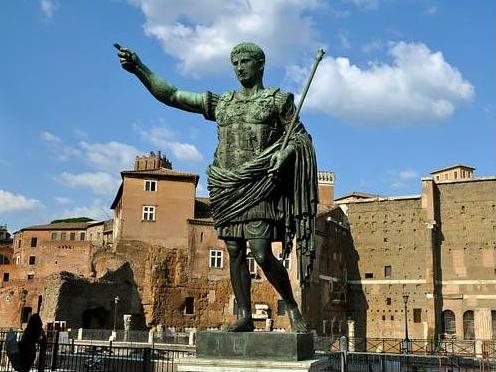
|
Despite this, Augustus' reign during the Roman Principate period was more peaceful than the Second Triumvirate, and the economy was thriving. Augustus brought what we call the Pax Augusta. Due to many people becoming richer, most of the upper class in Rome supported the emperor. Augustus was also conquering new lands such as Cantabria, Aquitania, Raetia, Dalmatia, Illyricum, and Pannonia. Some of his generals became very popular, including Marcus Vipsanius Agrippa, Nero Claudius Drusus, and Germanicus.
Augustus' reign was also rich in literature, with authors such as poets Vergil, Ovid, and Horace and historians like Livy. Furthermore, Augustus changed the Roman calendar and introduced the month of August.
Tiberius (reign: 14 AD - 37 AD)
Augustus had a wife called Livia Drusilla, who had a son from a previous marriage named Tiberius. She pressured Augustus to have her son named as his heir, and the Senate agreed. Tiberius received all the honours and held the title of princeps.
However, Tiberius had no interest in politics and retired to the island of Capri in 26 AD after getting the approval of the Senate. The city of Rome was under the control of praetorian prefects Sejanus and later Macro from 26 to 31 AD and 31 to 37 AD, respectively. Many Romans considered Tiberius an evil emperor, suspecting him of killing his own relatives, General Germanicus, who was one of the very popular generals, and even his own son Drusus Julius Caesar.
Tiberius died of old age in 37 AD, although historian Tacitus gives another account: Romans first rejoiced when news spread of Tiberius' death from natural causes, but they became quiet upon hearing that he had recovered from his illness. Caligula and Macro then choked him to death, and Romans rejoiced again.
Caligula (reign: 37 AD - 41 AD)
Caligula, Tiberius' grand nephew, was chosen to rule the Empire as there was no male in Tiberius' bloodline old enough to do so. At the beginning of his reign, Caligula was quite popular. However, two years into his reign, he became mad and historians of the time state that he organized orgies, had sexual relationships with his sisters, killed men for fun, and even named a horse consul. Caligula was killed by the Praetorian Guard four years into his reign.
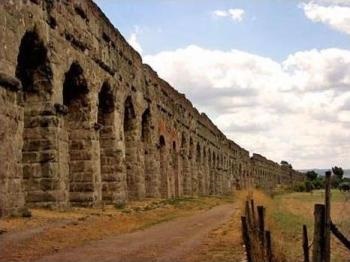
|
Claudius (reign: 41 AD - 54 AD)
The Praetorian Guard proclaimed Claudius, Tiberius' nephew, as the new emperor with the full approval of the Senate. Despite his lack of charisma, limping, and slight deafness, he was the only man belonging to the Claudian family alive following Caligula's assassination.
Claudius turned out to be a decent emperor in the Roman Principate, managing the empire efficiently. His reign lasted 13 years during which he built many new roads, canals, and aqueducts. He conquered Thrace, Lycia, Judaea, and even started the conquest of Britain.
Nero (reign: 54 AD - 68 AD)
Claudius's wife Agrippina the younger poisoned him in 54 AD, and Nero, her son from a previous marriage, was proclaimed emperor upon his death. Nero is remembered as a cruel and brutal emperor of the Roman Principate, suspected of being behind the Great Fire of Rome during his reign (according to legend, Nero was fiddling as Rome was burning). He executed many Christians and faced many revolts, which he squashed, including the Jewish revolt, also known as the First Jewish-Roman War. Eventually, many in the Roman aristocracy turned against him, including the entire Senate, and Nero committed suicide.
Flavian dynasty (69 - 96 AD)
The Year of the Four Emperors
Following Nero's death in 68 A.D., a brief civil war occurred, known as the Year of the Four Emperors in the Roman Principate. Four emperors ruled during the year 68 to 69 AD: Galba, Otho, Vitellius, and Vespasian.
Vespasian (reign: 69 AD - 79 AD)
Vespasian, a general under Claudius and Nero, became the first emperor of the Flavian Dynasty in July 69 AD. He was a good emperor known for rebuilding Rome's buildings following the Great Fire of Rome and constructing the Colosseum, using the wealth acquired during the First Jewish-Roman War.
Titus (reign: 79 AD - 81 AD)
Vespasian's son, Titus, fought alongside his father during the First Jewish-Roman War. He completed the construction of the Colosseum and organized games that lasted for a hundred days, celebrating the victory over the Jews. His reign was short-lived, as he died from an illness in 81 A.D. Titus built roads throughout the empire and fortifications in what is now Germany and Northern England.
Domitian (81 - 96 AD)
Domitian was a totalitarian emperor of the Roman Principate who sought to establish a cult of personality by comparing himself to the Gods. He wanted to be known as Dominus et Deus, which means Master and God in Latin. The Roman aristocracy did not approve of him, and he was eventually murdered by a conspiracy.
Nerva–Antonine dynasty (96-192 AD)
Overview
The Nerva-Antonine dynasty was a prosperous period for Rome during the Roman Principate, marked by stability with no civil wars or military defeats abroad. During this period, the Roman Empire achieved its peak in terms of territory and its economy flourished. The provinces in the Empire were more united. Emperors were selected based on their qualities rather than their bloodline, which was remarkable for that time. Additionally, the constitution was respected and revered, and the Senate held more authority.
Nerva (reign: 96- 98 AD)
Nerva was appointed by the Senate and was of noble ancestry. He had previously served as an advisor during Nero's reign and the Flavian dynasty. Nerva restored many of the freedoms that were suppressed under Domitian, and Rome's economy thrived under his rule.
Trajan (reign: 98 - 117 AD)
Nerva named general Trajan as his successor. Trajan was a popular general in the Roman Principate and became the first emperor of non-Italian descent. His family hailed from Hispania and was not patrician. Romans were very enthusiastic about Trajan, in part because of his victories as a general.
Trajan was also a good emperor. He continued Nerva's policies by reinstating many of the freedoms lost under Domitian. Many people were freed, and private property that had been confiscated during Domitian's reign was returned. Trajan is also remembered for his construction works, including the Trajan Market, the Trajan Forum, and Trajan's Column, all dating from the Roman Principate and still visible today. He also built a large bridge over the Danube in Dacia.
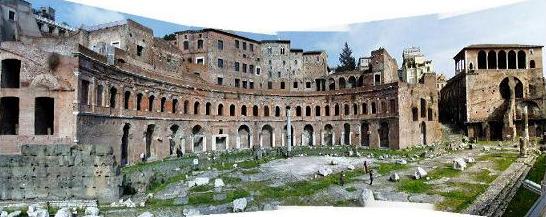
|
Trajan managed to conquer Dacia, a kingdom that had humiliated Domitian in the past. In the First Dacian War (101-102 AD), Dacia became a client state, and in the Second Dacian War (105-106 AD), the Dacian army was completely destroyed, making Dacia a part of the Roman Empire. Trajan also integrated another client state, the state of Nabatea, located in today's southern Syria and northern Jordan, and conquered Parthia, located in today's north-eastern Iran, over Armenia. In 117, Trajan died of an illness.
Hadrian (reign: 117 - 138 AD)
Trajan named Hadrian as his heir, and one of the first initiatives Hadrian took was to remove Roman troops from Parthia and Mesopotamia, and as a result, lost these conquests. During the Roman Principate, the Roman economy continued to thrive under Hadrian's peaceful and humanitarian reign. He is known for his defensive strategies, including Hadrian's Wall in northern England, and introducing laws against torture. He loved Greek culture and built various infrastructure, including public baths and aqueducts, as well as libraries and theatres.
Antoninus Pius (reign: 138 - 161 AD)
Antoninus Pius continued Hadrian's policies, promoting culture and knowledge. He built theaters, set up financial rewards for philosophy teachers, and expanded the empire in England by conquering southern Scotland and building the Antonine Wall.
Marcus Aurelius (reign: 161 - 180 AD)
Marcus Aurelius, also known as the Philosopher, ruled the Roman Empire during the period of the Roman Principate alongside his co-Emperor Lucius Verus. He fought the Marcomannic wars against the Parthian Empire and wrote a philosophy book called Meditations. During his reign, the Empire was struck by the Antonine Plague, a pandemic that claimed the lives of close to five million people.
Commodus (reign: 180 - 192 AD)
Commodus, the son of Marcus Aurelius, broke with tradition by becoming emperor based solely on his lineage rather than his qualities. Unlike his predecessors, known as the Five Good Emperors, Commodus was known for his cruelty, including executing many Roman citizens and participating in gladiatorial combat. He was also known for his decadent personal life.
The Severan dynasty (192-235 AD)
Commodus was eventually killed by a conspiracy organized by Quintus Aemilius Laetus and his wife. The next year was a period of turmoil with Roman generals fighting for power. Eventually, General Septimius Severus became the new emperor after winning many battles, including one in Gaul.Septimius Severus (reign: 192 - 211 AD)
Severus is not remembered as a good emperor either. He wanted to restore a totalitarian state and admired the cruelty of Marius and Sulla. In a Senate speech, he praised Sulla, which worried many senators. Although he had the support of the legions, he paid them handsomely, leading to high military expenditures and a financial crisis at the beginning of the 3rd century.
Severus was known for his fierceness and brutality on the battlefield. When Parthia entered Roman territory, Severus attacked and looted many Parthian cities, including Babylon, Seleucia, Nisibis, and the Parthian capital, Ctesiphon. Many people were captured and executed. However, the invasion of Parthia did not end well, as many of his legions starved to death, and Severus was forced to withdraw.
Severus also attempted to conquer Britain but suffered heavy casualties due to the difficult terrain and the Caledonians' use of guerrilla warfare. The ferocious Severus fought himself on the battlefield but was struck down by illness and died in 211 AD.
Caracalla (reign: 211 - 217 AD)
Upon Severus' death, both of his sons, Caracalla and Geta, became emperors. However, Caracalla quickly removed his brother and became the sole emperor. Like his father, Caracalla was a man of war and cruelty, executing many people, including his tutor and a close friend of his father. Despite this, he had the respect of the legions.
One of the most extreme examples of Caracalla's cruelty was the massacre of most of the inhabitants of Alexandria. Knowing that the people of Alexandria disliked him, Caracalla invited the city's high society to a banquet and then had his soldiers kill all the guests. He then marched into Alexandria with his army and killed almost the entire city's population.
Caracalla is famous for the Edict of Caracalla, which granted Roman citizenship to all free men living in the Empire. He is also known for the Baths of Caracalla in Rome, which still exist today. Caracalla was killed by one of his soldiers during a campaign in Parthia in 217 AD. The soldier had carried out an order from the Praetorian prefect Macrinus.
Elagabalus (reign: 218 - 222 AD)
Macrinus was in power for less than one year before Elagabalus, a member of the Severi, with the support of the legions, overthrew him. Elagabalus, however, was an incompetent ruler and known for his extravagant lifestyle.
Alexander Severus (reign: 222 - 235 AD)
Alexander Severus, Elagabalus' cousin, faced many conflicts during his reign, including wars with Persia and Germanic invaders in Gaul. These conflicts resulted in significant losses, and many of his soldiers were unhappy with him. Alexander was eventually killed by his own soldiers during his campaign in Germania.
The Crisis of the Third Century
After the death of Alexander Severus, a period of political chaos ensued. The last period of the Roman Principate saw 26 emperors in the following 49 years, most of whom came to power through war and did not belong to old noble Roman families. A combination of very negative factors made things even worse towards the end of the Roman Principate: civil wars broke out throughout the Empire, foreign invasions, a deep economic depression combined with hyperinflation, and pandemics spreading like wildfire (including the Plague of Cyprian in 250 AD). The emperors were more concerned about staying in power than the economy or defending the borders of the Empire. Roman people gradually lost faith in their old religions and values, turning increasingly to Christianity and the cult of Mithra.In 260 AD, the provinces of Egypt, Palaestina, Syria, and Asia Minor separated from the Empire and formed the Palmyrene Empire ruled by Queen Zenobia from Palmyra in Syria. That same year, Britain and Gaul also broke away to form the Gallic Empire. Rome lost its importance in the Empire. It was only during the reign of Aurelian (271-275 AD) that the Gallic and Palmyrene Empires were reconquered. The crisis ended completely during the reign of Diocletian at the end of the Roman Principate.
SOURCES
- SPQR: A History of Ancient Rome (M. Beard, Liveright 1 edition, 2016)
- The Roman Empire: A Very Short Introduction (C. Kelly, Oxford University Press, 2006)
- Space, Geography, and Politics in the Early Roman Empire (Claude Nicolet, Thomas Spencer Jerome Lectures, 2015)
YOU MAY ALSO LIKE
Return from Roman Principate to Roman Empire
Return from Roman Principate to Homepage
